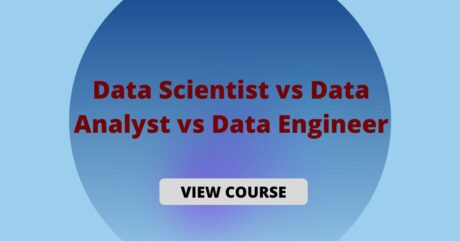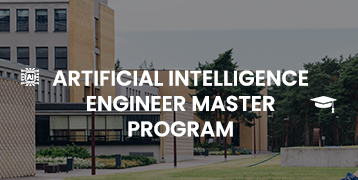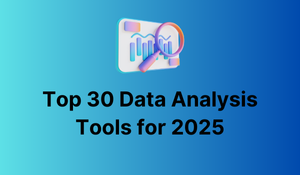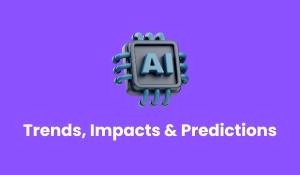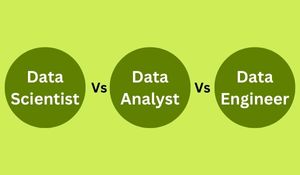
Table Of Content
Data Scientist vs Data Analyst vs Data Engineer: Job Role, Skills, and Salary
Data is the real power in today’s world. Data can unlock the success of any sector, from releasing innovations to enhancing decision-making processes. As we all know, data has altered the world so that it is impossible to function without the insights created by data in any discipline.
With the growing significance of data, a plethora of data-related career responsibilities and possibilities have sprung up all over the world. According to the conclusions of an industry survey, Data Science will account for 28% of all digital occupations by 2020. Moreover, they are incredibly profitable due to the tremendous speed of data generation and the rising need to make sense of it. However, the same research emphasizes this industry’s severe talent shortage.
The fundamental cause for this field’s talent deficit is a lack of clarity about the abilities necessary for each function. Companies want to employ specific, specialized skill sets rather than jack-of-all-trades. To avoid being called a generalist, you must first grasp the distinctions between the three essential data roles: Data Scientist, Data Engineer, and Data Analyst.
It is a prevalent misperception that the previous roles are interchangeable. This guide will look at job descriptions, organizational positions, necessary skill sets, and income expectations for each intriguing data profession.
Enroll Now GoLogica on Data Science Course
Data Analyst, Engineer, and Scientist: The Key Difference
Data has always been critical in decision-making. Today’s world is entirely data-driven, and no business could thrive without data-driven decision-making and strategic goals. Because data provides essential insights and trust, various professions in the sector today deal with it. Let’s compare and contrast the roles of a data analyst, data engineer, and data scientist.
Data Analyst
Most entry-level workers interested in a career in data begin as data analysts. Qualifying for this position is as straightforward as it can be. First, you need a bachelor’s degree and a solid grasp of statistics. Strong technical abilities will give you an advantage and might put you ahead of the competition. Aside from that, employers need you to comprehend data management, modeling, and reporting methodologies, as well as a solid understanding of the industry.
Data Scientist
A data scientist analyzes, understands, and predicts a large amount of digital data. Therefore, gaining enough experience and understanding of data scientist abilities is the most straightforward path to becoming a data scientist. These abilities include extensive statistical analyses, a thorough knowledge of machine learning and data conditioning, and so on.
Data Engineer
A Data Engineer typically obtains a master’s degree in a data-related discipline or has extensive experience as a Data Analyst. Ideally, a Data Engineer should possess a solid technical background and be able to create and integrate APIs. They must also be familiar with data pipelines and performance optimization.
Job Descriptions and Organizational Roles
A Data Scientist uses advanced data techniques to derive business insights, such as clustering, neural networks, decision trees, etc. You will be the most senior team member in this capacity and should have extensive knowledge in various fields like machine learning, statistics, and data management.
You will receive feedback from Data Analysts and Data Engineers and be responsible for creating actionable business insights. You should be able to perform the duties of both a data analyst and a data engineer. However, the skill sets of a data scientist must be more comprehensive and in-depth.
A Data Analyst is an entry-level position on a data analytics team. In this capacity, you must be skilled at converting numerical data into a format everyone in a company can understand. Furthermore, you must be proficient in various areas, including programming languages such as Python, tools such as Excel, and data processing, reporting, and modeling principles. With enough experience, you may go from being a data analyst to a data engineer or a data scientist.
Data engineers serve as the go-between for data analysts and data scientists. You will match and prepare data for operational or analytical use as a data engineer. Data engineers must have extensive experience designing, developing, and managing data architectures. In this capacity, you will often work on Big Data, compiling reports and sending them to data scientists for study.
The Skill Sets
Coding abilities are essential for each job area. Data scientists must be proficient in programming languages such as Java, Python, SQL, R, and SAS, to mention a few. You should also be familiar with Big Data frameworks such as Hadoop, Spark, and Pig. Understanding the fundamentals of technologies such as Deep learning, Machine learning, and others can also help you advance in this profession.
What you should know about a data analyst position is that it is less technical. It is an entry-level position that requires knowledge of programs such as SAS Miner, Microsoft Excel, SPSS, and SSAS. In addition, it would be advantageous if you have a basic familiarity with Python, SQL, R, SAS, and JavaScript.
A Data Engineer must thoroughly grasp programming languages such as Java, SQL, SAS, Python, and others. In addition, it’s better if you are comfortable working with frameworks like Hadoop, MapReduce, Pig, Hive, Apache Spark, NoSQL, and Data Streaming, to name a few.
Salary
The USA Bureau of Labor Statistics reports that the average income for a data scientist is $100,560. Firms realize the value of big data and want to leverage it to make better business decisions, which drives high salaries in data science. Because the supply of data professionals has not yet kept up with demand, beginning pay for these roles remains high, particularly for those with a master’s degree in data science or a related discipline.
It’s no secret that data scientists can provide enormous value to any organization. However, finding one individual who can accomplish all the activities required of a data scientist is complex, and competition for these specialists is severe. As a result, firms are prepared to offer premium wages to competent data scientists.
Numerous factors determine the income of a data scientist, including:
Experience: Experience is one of the most critical variables in a data scientist’s remuneration, according to O’Reilly’s 2021 Data Science Salary Survey. Data science specialists earn an extra $2,000 to $2,500 each year of expertise.
Job Title: According to O’Reilly’s data science pay research, 45 percent of individuals polled held the title “data scientist.” Another 31% work in senior management, as an engineer, developer, programmer, or in some other capacity. Generally, a higher-income data science expert engages in managerial responsibilities, such as directing team projects, finding business challenges using analytics, or dealing with external parties.
Industry and Business Size: The following industries have the highest median data science salaries:
- Cloud computing, hosting, and CDNs
- Social networking and research
- Finance and banking
It’s worth noting that just 12% of data scientists polled by O’Reilly worked in these three businesses. Instead, almost one-third worked in consulting or software (SAAS, web, and mobile).
Unsurprisingly, some of the highest-paid data scientists work for prominent technology corporations. Here are the average wages at a few well-known companies:
- Google: $152,856
- Apple: $145,974
- Twitter: $135,360
- Facebook: $134,715
- PayPal: $132,909
- Airbnb: $127,852
- Microsoft: $123,328
In corporate size, the higher the compensation, the larger the firm. A data scientist, for example, would likely earn more at a firm with at least 10,000 employees than in a company with less than 1,000 employees.
Region: The earnings of data scientists are heavily influenced by where they reside. The highest salaries are found in California, which also happens to be home to the majority of data scientists polled by O’Reilly. The Pacific Northwest has fewer data scientists than the rest of the country, but it pays the second most.
Education: Data scientists are in short supply, especially those with the proper combination of education and abilities. At a fundamental level, data scientists must be able to write code. Individuals who code four to eight hours per week get the most incredible pay, while those who don’t code earn the lowest.
Data scientists must also be able to use big data technologies and learn new ones, as well as open-source tools, cloud computing, and data visualization. It is not enough to merely understand how to utilize these technologies; data scientists must also understand how to use them to obtain meaningful insights that will benefit their company.
Furthermore, employment in data science needs keen commercial acumen, scientific curiosity, and excellent leadership and communication abilities. Having them will have a significant impact on compensation.
Your Responsibilities
Organizations are increasingly relying on data in their day-to-day operations. A data scientist examines raw data and pulls meaningful meaning from it. They then utilize this data to identify trends and provide solutions that businesses require to grow and compete.
If we were to define a data scientist, we would say someone who creates value from data. Are you wondering what a data scientist’s work entails? No prizes for guessing that a data scientist’s day revolves around – as the job title implies – data and data everywhere.
The data scientist’s responsibilities include gathering and analyzing information from multiple sources to comprehensively understand how a company functions. Scientists use statistical and analytical approaches and AI tools to automate certain organizational activities and provide intelligent solutions to business difficulties. After evaluating the data, they deliver the results straightforwardly and engagingly. The goal is to assist the company in analyzing patterns to make better decisions. As a result, a successful data scientist must have an excellent balance of technical, analytical, and communication abilities.
It is necessary to recognize that it grew and extended from the data analyst position to comprehend the data scientist function.
An enterprise’s data analyst and data scientist organize and analyze massive data. However, the data scientist must also use business sense and communication abilities to influence how the firm approaches business difficulties.
Data scientists integrate practical skills such as computing and arithmetic with statistical analysis to get outcomes. For example, a data scientist working for a social networking site may evaluate the pages people ‘Like’ and then select what kind of adverts they would see when they check in.
Data Scientist
As a data scientist, you are responsible for the following tasks:
- Unstructured data must be managed, mined, and cleaned before using it.
- Create models that can work with Big Data.
- Recognize and comprehend Big Data analysis.
- Please take responsibility for the data team and assist them in achieving their objectives.
- Produce findings that have a direct influence on business outcomes.
Data Analyst
As a data analyst, you will be responsible for the following tasks:
- Using a query to retrieve information from a database.
- Enable data processing and outcomes summarization.
- In their work, they employ fundamental techniques such as logistic regression, linear regression, and so on.
- Possess and demonstrate extensive knowledge in data munging, visualization, exploratory data analysis, and statistics.
Data Engineers:
Your obligations in this capacity are as follows:
- Data mining is used to gain insights from data.
- Erroneous data is converted into a usable form for data analysis.
- Creating data queries
- Upkeep of the data design and architecture.
- Create big data warehouses with the assistance of additional transform load (ETL).
Companies That Will Hire You
Before entering the data science job market, you should know which organizations would be the most excellent fit for you. When looking for the optimum fit, consider the following:
- Do I want to work on the company’s projects or products?
- Is the company’s remuneration competitive?
- Is the company’s benefits package comprehensive, including health/life insurance, paid time off (PTO), profit sharing, and retirement benefits?
- What is the current market reputation/public impression of the company?
- Is there a culture of trust, flexibility, cooperation, and positive feedback at the company?
Data scientists are in great demand at firms like Facebook, Citibank, Intel, Amazon, Schneider, S&P Global, and Moody’s. In addition, entry-level positions as a data analyst are available in firms like Infosys, 24/7, Oracle, Southwest, Walmart, VISA, Capital One, Credit Suisse, and others. Finally, a data engineer may be employed by big corporations such as Google, Apple, Cognizant, Spotify, Microsoft, AT&T, CISCO, and FLOWCAST, to mention a few, as well as product manufacturers such as Intel and Amazon.
Conclusion
Data science is tremendously popular, and a lot of hype surrounds the discipline. However, other data-related jobs are quickly expanding and similarly promising in compensation and demand.
Data scientists, engineers, and analysts play critical roles in the data lifecycle. As a result, organizations need knowledge in these areas to make data-driven decisions that bring business value.

